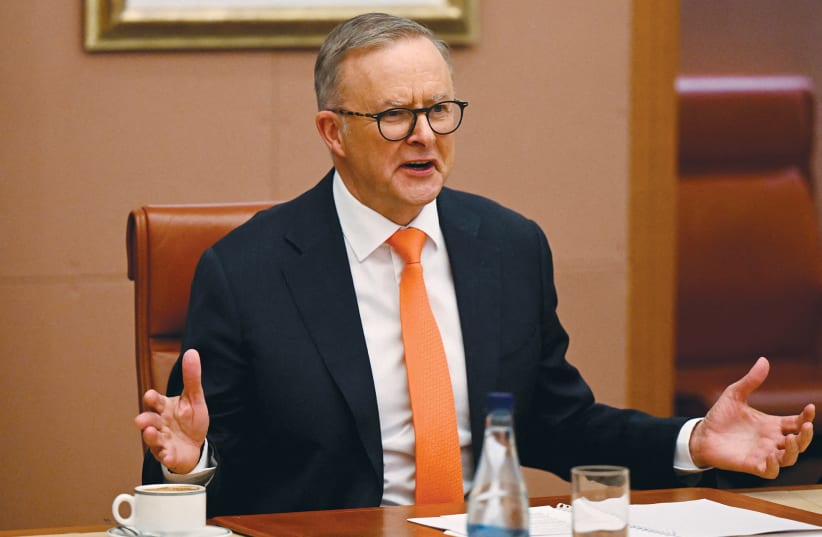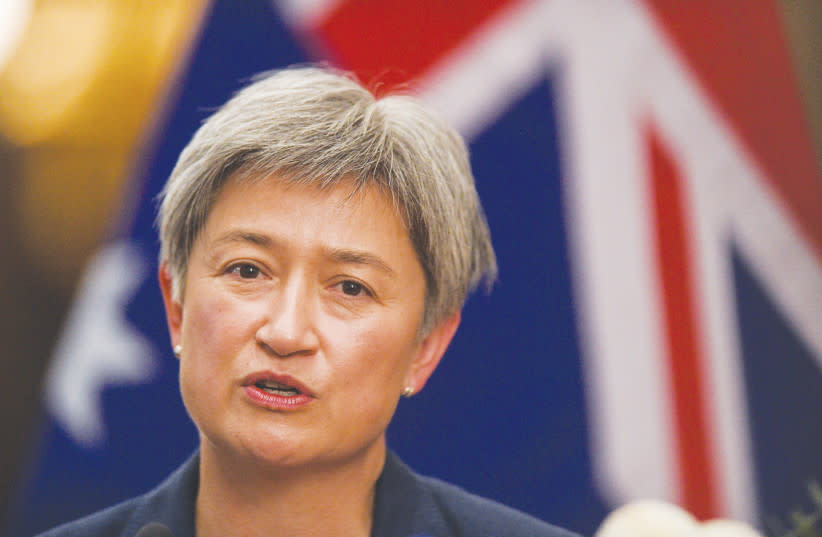The Australian government once again considers Israeli settlements in the West Bank to be in violation of international law, and will return to using the term “occupied Palestinian territories,” Australian Foreign Affairs Minister Penny Wong told parliament on Tuesday.
“The Australian government is strengthening its opposition to settlements by affirming they are illegal under international law and a significant obstacle to peace,” Wong said. “In adopting the term, we are clarifying that the West Bank, including East Jerusalem and Gaza, were occupied by Israel following the 1967 War, and that the occupation continues.”
Still, Wong said, Australia would remain a “committed friend of Israel.”
The change “reflects legal advice and UN Security Council resolutions” and will have Australia use the same language as the UK, New Zealand, and Europe, Wong pointed out. It comes after Canberra issued a statement last month saying that they were “deeply concerned” by the advancement of settlement plans, which they argued reduced “the prospects for peace” but did not say were illegal.
Australian ministers refrained from using the terms “occupied” or “occupation” in relation to the West Bank since 2014. Before that, the terms were used inconsistently, according to a report from the Australian Broadcast Corporation.
Wong belongs to the Labor Party, which passed a resolution in June calling on Australia to “recognize Palestine as a state.” The party is holding another major conference next week.
Liberal MP Julian Lesser, who is Jewish, noted the timing of the conference to the ABC, saying “that Australian foreign policy is subject, while this government is in power, to the whim of the faction bosses within the Labor movement who are controlling their national conference.
“This decision will not help a two-state solution on the ground, it will only embolden and please... terrorist organizations, like Palestinian Islamic Jihad,” he said.
Shadow Foreign Minister Simon Birmingham told the ABC that it is “extremely regrettable that Labor’s internal differences are undermining the consistency of Australia’s position on these matters.”
Responses of local Jewish organizations to the decision
The Zionist Federation of Australia and the Executive Council of Australian Jewry said they are “deeply concerned” by the decision.
“Canberra was only made the capital of Australia in 1913, when the city had to be built from scratch, whereas Jerusalem has been the capital of the Jewish people for over 3,000 years.”
Arsen Ostrovsky
The organizations’ respective presidents Jeremy Leibler and Jillian Segal called the change “inaccurate, ahistorical, and counterproductive.”
“Describing East Jerusalem, the West Bank, and Gaza as ‘occupied Palestinian territories’ effectively denies any Jewish claim to the West Bank and Jerusalem. The most important Jewish holy sites of the Temple Mount and the Western Wall are in East Jerusalem, and there has been an unbroken Jewish presence in the West Bank for thousands of years,” they said. “Israelis and Palestinians have agreed to negotiate the division of the West Bank between them. Describing the territories as ‘Palestinian’ not only preempts the outcome of negotiations but is counterproductive.”
Segal and Leibler also argued that “the announcement will be used by Israeli and Palestinian hardliners to bolster support within their respective constituencies and put a peace agreement further out of reach.”
International Legal Forum CEO Arsen Ostrovsky called the decision “highly flawed and one-sided,” as well as “contrary to established principles of international law.”
“Despite highly biased political proclamations in some international arenas, such as the United Nations, the status of Judea and Samaria, which form a central and indisputable part of Jewish history, are subject to final status negotiations and to which Israel has a legitimate legal right,” Ostrovsky said.
“For the record,” he added, “Canberra was only made the capital of Australia in 1913, when the city had to be built from scratch, whereas Jerusalem has been the capital of the Jewish people for over 3,000 years.”
Ostrovsky also noted that Australia plans to deem Gaza occupied, even though Israel evacuated Gaza in 2005.
Last year, the Australian Foreign Ministry reversed a 2018 policy to recognize western Jerusalem as Israel’s capital, while it “acknowledged the aspirations of the Palestinian people for a future state with its capital in East Jerusalem.” The reversal took place on the holiday of Simchat Torah, further upsetting Australian Jewish organizations that opposed the change.

